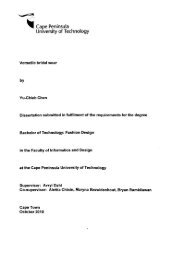E-commerce - Cape Peninsula University of Technology
E-commerce - Cape Peninsula University of Technology
E-commerce - Cape Peninsula University of Technology
You also want an ePaper? Increase the reach of your titles
YUMPU automatically turns print PDFs into web optimized ePapers that Google loves.
Chapter 2: Uterature review Page 25<br />
figuratively), with all employees having a direct electronic link. Such customer<br />
led approaches, according to Siegel (2000), involve listening to customers in<br />
a strategic way, deepening relationships and loyalty. E-retailers are reminded<br />
that the benefits <strong>of</strong> e-<strong>commerce</strong> are not just faster ordering from bigger<br />
catalogues, but better service and a closer relationship with a more 'faithful'<br />
customer.<br />
Newe" (2000) highlighted that companies must leverage customer<br />
information for the effective management <strong>of</strong> customer relationships on the<br />
Internet. Seybold and Marshak (1998) made similar points, again focusing on<br />
the need for customer-focused strategies that engage customers and build<br />
communities <strong>of</strong> loyal customers. Such strategies suggest something much<br />
more radical than the basic e-<strong>commerce</strong>lbrochure-ware approach adopted by<br />
many businesses at the moment. It calls for a re-engineering <strong>of</strong> processes<br />
and structures focused around key customer groups, rather than product or<br />
service divisions. It also implies cross-functional, team working. As Siegel<br />
(2000: 107) puts it:<br />
"[a] customer-led company has a broad interface across which all<br />
employees can get to know their customers. Employees invite<br />
customers in to collaborate on new products, support systems, and<br />
methodologies. Facilitating those interactions will take new<br />
communication skills, new tools, and the ability to move people in and<br />
out <strong>of</strong>product teams easily".<br />
In addition, most e-retail businesses today are not prepared to create truly<br />
unique and special <strong>of</strong>fers for individual customers based on customer pr<strong>of</strong>ile<br />
information (Siegel, 2000). Infact, most companies are still only capable <strong>of</strong><br />
<strong>of</strong>fering relatively simple solutions based on customer preference data.<br />
Siegel (2000) further explain that creating uniquely customised product <strong>of</strong>fers<br />
to target customers, requires better data not just about the customer's<br />
preferences, but about the products as well.
















